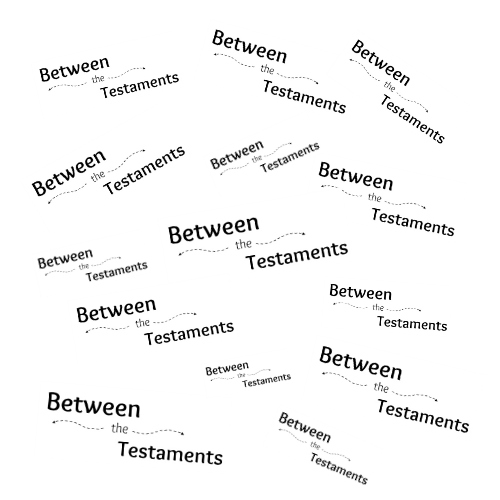Between the Testaments (Introduction)

(Introduction, Review of the Empires)
Intro: the purpose of this study is to help us understand some of the events of the New Testament. As we transition form the Old to the New Testaments we see there are some differences with the political, social, and religious landscape. It is my desire that this study will help clarify some of these issues. A few examples are:
-
In the OT Samaritan was a part of the Nation of Israel with no animosity toward them, but in the NT there is a great deal of disdain toward them.
-
When we leave the OT the Meade Persian empire is in control, but upon arrival in the NT we see the Romans in charge.
-
In the OT, after the temple was established, there was only one place to worship, in the NT there are Synagogs located all over.
-
There are other issues that seemingly arise out of nowhere, why was there hatred toward the Roman empire, Why were some Jews helping the Romans do their job, ie. tax collector what happened to the Hebrew language, where the different sects of Judaism came form (Sadducee Pharisees, Sanhedrin..)
I believe that as we learn about some of the transition of the OT to the NT, we will learn and discover some important lessons in the NT.
-
The Kingdom Years, 1050 B.C.- 606ish B.C. (depending where we end, with Babylon, or the last king)
-
Israel wanted to be like “other nations”
-
Israel Rejected God,
-
I Samuel 8:1-8 “And it came to pass, when Samuel was old, that he made his sons judges over Israel.2Now the name of his firstborn was Joel; and the name of his second, Abiah: they were judges in Beer-sheba.3And his sons walked not in his ways, but turned aside after lucre, and took bribes, and perverted judgment.4Then all the elders of Israel gathered themselves together, and came to Samuel unto Ramah,5And said unto him, Behold, thou art old, and thy sons walk not in thy ways: now make us a king to judge us like all the nations.6But the thing displeased Samuel, when they said, Give us a king to judge us. And Samuel prayed unto the LORD.7And the LORD said unto Samuel, Hearken unto the voice of the people in all that they say unto thee: for they have not rejected thee, but they have rejected me, that I should not reign over them.8According to all the works which they have done since the day that I brought them up out of Egypt even unto this day, wherewith they have forsaken me, and served other gods, so do they also unto thee.”
-
God wanted Israel to be a Theocracy, that is to have a nation that was lead by God and not by man.
-
This is the way God wants to rule in an individual basis today with each of us, but often we opt for a rule of man, specifically our-self.
-
-
-
-
-
The United Kingdom,
-
All Israel served under 1 king,
-
there were only 3 kings in the united Kingdom, and Israel never possessed all of the land that God had promised them.
-
-
Saul, The First King, 1050-1010 B.C.
-
Saul was the king that was chosen by man, they looked on Saul and saw a big man and desired him to be their king. (I Samuel 10)
-
even tho Saul looked like what the world would want as king, he was not the type of man God would approve of,
-
I Samuel 15:11 “It repenteth me that I have set up Saul to be king: for he is turned back from following me, and hath not performed my commandments. And it grieved Samuel; and he cried unto the LORD all night.”
-
So God replaced him.
-
-
-
David, the Second King, 1010-970 B.C
-
David was chosen by God and not the nation, David was a man that had a heart after the heart of God (I Samuel 13:14 & Acts 13:22)
-
David was not appointed his position because of his looks, but his heart.
-
But his heart would not be all it took to be a good king.
-
David experienced many hardships in his life that helped fashion him to be a good king. He learned the leadership of men, earning the respect an loyalty of men. He learned warfare leading them into battle. He learned how to manage the affairs of a king.
-
-
Because of the heart and nature of David, God promised him an enduring kingdom,
-
II Samuel 7:11-16 “And as since the time that I commanded judges to be over my people Israel, and have caused thee to rest from all thine enemies. Also the LORD telleth thee that he will make thee an house.12And when thy days be fulfilled, and thou shalt sleep with thy fathers, I will set up thy seed after thee, which shall proceed out of thy bowels, and I will establish his kingdom.13He shall build an house for my name, and I will stablish the throne of his kingdom for ever.14I will be his father, and he shall be my son. If he commit iniquity, I will chasten him with the rod of men, and with the stripes of the children of men:15But my mercy shall not depart away from him, as I took it from Saul, whom I put away before thee.16And thine house and thy kingdom shall be established for ever before thee: thy throne shall be established for ever. ”
-
this simple fact helps establish Jesus as the True King of Israel, following his linage back to David.
-
It will also be the linage that is necessary during the millennium reign.
-
-
But, David would also be succeeded,
-
-
-
Solomon, the Third King of Israel, 970-930 B.C.
-
It was under Solomon that the Nation would be physically built up, and spiritually tore down.
-
He is the last of the kings that ruled over a united kingdom, after him division came into the nation.
-
But under him there were great building programs:
-
the royal palace, and the Temple to name a couple. Solomon did what David was forbidden to do, he built a permanent structure to house the temple.
-
I Corinthians 3:3 “For ye are yet carnal: for whereas there is among you envying, and strife, and divisions, are ye not carnal, and walk as men?”
-
notice the pattern: Carnality, Envying, Strife, and then Division. (I-Want-You have- division)
-
-
-
-
-
-
The divided Kingdom, 930-606 B.C.
-
The Northern Tribes,
-
the Northern tribe consisted of 10 tribes of Israel (Asher, Dan, Gad, Issachar, Joseph [2 tribes: Ephraim and Manasseh], Naphtali, Reuben, Simeon, Zebulun. )
-
during the years of the divided kingdom, the Northern tribes had 20 kings, and not one of them were considered to be good.
-
You can not be in rebellion of God and expect to be doing the right thing.
-
The Northern tribe was in rebellion, wither or not they felt they had reason to leave, they were out of the will of God.
-
The same is true for us today, if we rebel against God, then we are out of His will plain and simple. People get mad ad cause a separation, and division is not the will of God, but the work of man.
-
-
-
-
The Southern Tribe,
-
simply to say the Northern tribe was out of the will of God does not justify the Southern kingdom.
-
It is like the old saying it takes two to tango. The Southern tribe played their part in the problems.
-
-
The southern tribe was made up of Judah and Benjamin.
-
You will notice the tribe of Levi was not counted with either, they were involved in both the north and the south. (wonder where the different sects of Jewisdim in the NT came form?)
-
-
The southern tribes had 20 kings as well, some were considered good, and some were not.
-
-
-
Send in the Prophets,
-
it was during the kingdom period that the prophets started to appear.
-
God sent men like Elijah, Elisha, Amos, Hosea to try to turn the hearts of both the Northern and the Southern to God.
-
The Prophets touched on virtually every issue, from social to political,economical to religious issues.
-
They were sent to turn the heart of the people back to God, but were in large part rejected. And even if they were among the few that were not rejected, they were not taken seriously.
-
-
Of course the prophets would be scatted through the rest of the history of the OT, through the kingdom period as well as the exile, and rebuilding period.
-
-
-
-
The Assyrian Empire,
-
An Early Kingdom,
-
All the way back to Genesis,
-
We see the Assyrian people as far back as the book of Genesis,
-
tho we find the Assyrians as far back as Genesis, it is not until the mid 800’s B.C. That they really start to rise to power.
-
Then it was the mid 700’s that Assyria started to look toward Israel.
-
The final straw fro Assyria to attack Israel was when Hoshea refused to pay tribute to them, (II Kings 16)
-
-
-
Assyria takes over the Northern Kingdom.
-
This is essentially the last of the northern tribes.
-
The practice of Assyria was to deport and import. They did this as a way of assimilating the people to become one people.
-
They removed Jews to other areas in the Assyrian empire and brought gentiles in to replace them.
-
-
Samaria. This is the answer to one of our first questions. Why were they part of Israel in the OT, but disliked in the NT?
-
When Assyria brought Gentiles in, the remnant of Jews in the region known as Samaria intermingled with them. Married and had children. The other Jews, to the south saw this as a strike against not only their heritage, but also the word of God. So they were rejected and despised by the Jewish people there after.
-
As I said this pretty well does away with the northern tribes.
-
-
-
Assyria and the Southern Kingdom,
-
after the defeat of the Northern kingdom, it would only be natural for them to turn their attention to the south, which they did.
-
In around 701, the King planed an attack on Jerusalem.
-
II Kings 19 gives us an account of that event. As the army of Assyria headed toward the south, in one night, the Lord sent an angel and 185,000 soldiers were killed.
-
-
-
The Assyrians were a brutal people,
-
a mixture of pagan religion and unfeigned human desire lead them to be a cruel and wicked people.
-
They killed with out mercy, cut off the hands, fingers, toes of people.
-
Beheaded, impelled and placed on display as warnings to others.
-
It was in this impelling that crucifixion had it’s infancy. And would later be used to execute Roman prisoners.
-
-
This is one of the reasons Jonah was so wroth with God when he was sent to Nineveh to preach repentance.
-
Jonah had probably known people who were victims of their cruelty.
-
-
-
As with all earthly kingdoms, it to would come to an end.
-
-
-
